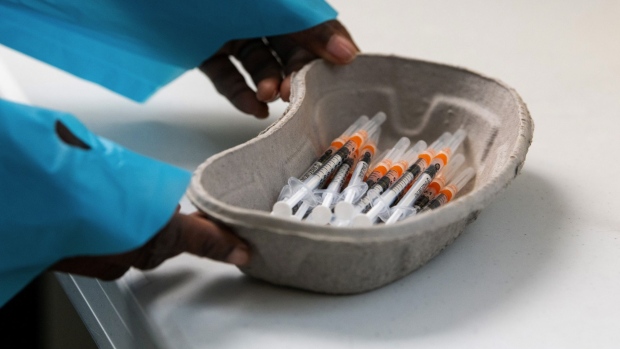Jan 25, 2023
Covid Boosters Protect Against Latest Omicron Strains in Study
, Bloomberg News

(Bloomberg) -- Updated Covid-19 boosters originally designed to protect against early omicron strains continued to reduce rates of illness from new mutants that have since spread rapidly throughout the US.
The shots’ effectiveness against symptomatic infection ranged from 38% to 50% in recent months as the XBB and XBB.1.5 strains became dominant, Centers for Disease Control and Prevention scientists said Wednesday. The boosters helped most in adults from the ages of 18 to 49, according to a study in CDC’s Morbidity and Mortality Weekly Report.
Covid has been continuously evolving to outrun efforts to target it with vaccines, as new mutants arise with vaccine- and immune-evasive variants. Researchers wanted to see whether vaccines specifically designed to target the early BA.4 and BA.5 versions of omicron continue to be effective.
“We did not see reduced vaccine protection against symptomatic illness for XBB and XBB.1.5 compared to those other recent BA.5 variants,” CDC epidemiologist Brendan Jackson said on a call with reporters.
The CDC study used pharmacy data to find people who had one or more Covid symptoms between Dec. 1 and Jan. 13, the period during which XBB and its relatives were circulating.
Some small studies estimate that booster effectiveness wanes substantially after three months. A recent preprint study from researchers at Harvard-affiliated Beth Israel Deaconess Medical Center in Boston and Los Alamos National Laboratory in New Mexico found that levels of immune proteins called neutralizing antibodies returned to a lower, pre-shot baseline just three months after boosting.
The study underscores why it is important for Americans to get the latest booster, CDC said. So far, very few — only 15.3% — have done so.
Immunization effectiveness and trends are likely to come up Thursday when US Food and Drug Administration advisers meet to discuss Covid vaccination schedules and vaccine composition.
©2023 Bloomberg L.P.


